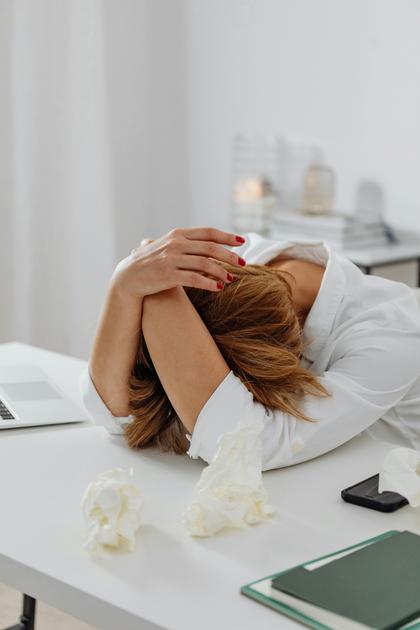Stress and Hair Thinning: Uncover the Hidden Cycle Women Face
Stress can impact women in many ways, often leading to hair thinning that goes unnoticed until it becomes a concern. Many women over 30 experience this frustrating issue without understanding the hidden cycle that fuels it. In this article, we will explore the connection between stress and hair problems, unveiling how one affects the other and what you can do to take charge of your health.
Understanding the Stress-Hair Connection
Stress is an everyday part of life, and for many women, it can feel overwhelming. The body reacts to stress in various ways, and one of the lesser-known consequences is hair thinning. The connection between stress and hair loss is supported by science, with numerous studies showing that stress can trigger a condition known as telogen effluvium. In this condition, hair follicles enter a resting phase, leading to noticeable thinning and shedding of hair.
Many women experience stress related to work, family, or personal issues, which can create a cycle of anxiety and physical symptoms. For those over 30, juggling multiple responsibilities can feel like an uphill battle. Recognizing the signs of stress and its impact on hair health is crucial in addressing these challenges.
How Hormonal Changes Affect Hair Health
Hormones play a significant role in hair health, especially for women. As we age, levels of hormones like estrogen and progesterone fluctuate. These hormonal changes can contribute to hair thinning. Reduced estrogen levels can lead to shorter hair cycles, meaning hairs fall out before they have a chance to grow back fully.
Additionally, conditions like polycystic ovary syndrome (PCOS) can exacerbate hair thinning. Women experiencing hormonal fluctuations might notice increased hair loss during times of significant stress, especially leading up to or during menstrual cycles. Understanding the hormonal impact on hair health is vital for recognizing and addressing these issues.
Recognizing the Signs of Hair Thinning
It’s essential to be aware of the signs of hair thinning so that you can take proactive steps. Here are some common indicators:
- Increased Hair Shedding: Finding more strands on your pillow, in your shower, or throughout your home.
- Thinning Appearance: Hair looks less voluminous or has noticeable bald spots.
- Texture Changes: Hair may feel finer or more brittle.
- Scalp Visibility: You may notice your scalp more than before due to reduced hair density.
If you recognize these signs, it may be time to explore solutions to strengthen not only your hair but also your overall well-being.
Stress Management Techniques for Women
Managing stress effectively is a key component in combating hair thinning. Here are several techniques that women can incorporate into their daily routines:
- Mindful Breathing: Deep, controlled breaths can help calm your mind and lower stress levels.
- Regular Exercise: Physical activity releases endorphins, promoting emotional well-being. Even a short daily walk can make a difference.
- Yoga and Meditation: Both practices foster a sense of peace and relaxation, helping to reduce stress.
- Time Management: Organizing your schedule can relieve the pressure of overwhelming tasks, giving you more time for self-care.
Implementing these practices doesn’t require an entire lifestyle overhaul; even small changes can lead to significant improvements in your stress levels and, subsequently, your hair health.
Nutrition’s Role in Hair Growth
Your diet plays an essential role in maintaining healthy hair. It’s important to ensure you’re getting the right nutrients:
- Protein: Hair is primarily made up of protein, so include lean meats, fish, beans, and nuts in your diet.
- Vitamins: Vitamins A, C, D, E, and B vitamins are crucial for hair health. They help with hair growth and maintenance.
- Minerals: Zinc and iron deficiencies can contribute to hair thinning. Incorporate leafy greens, seeds, and legumes.
- Omega-3 Fatty Acids: Found in fish, flaxseeds, and walnuts, these can help nourish the scalp and promote hair health.
Eating a balanced diet rich in these nutrients can help stabilize your body’s response to stress and support healthier hair growth.
The Importance of Self-Care Practices
Self-care is a vital aspect of managing stress and improving hair health. Many women neglect self-care, believing they do not have time. However, it’s crucial to prioritize times of relaxation and self-love. Here are some self-care practices:
- Develop a Skincare Routine: Taking care of your skin can boost your confidence and distract from hair loss.
- Indulge in Hobbies: Spend time on activities you love to relieve stress and refresh your mind.
- Connect with Loved Ones: Building connections can provide emotional support and reduce feelings of isolation.
- Rest and Recharge: Ensure you are getting adequate sleep. A well-rested body is more resilient to stress.
Implementing these self-care rituals can help combat the emotional burdens that often accompany hair thinning.
Natural Remedies to Combat Hair Thinning
In addition to lifestyle changes, several natural remedies may support hair health:
- Essential Oils: Oils like rosemary and lavender can stimulate hair growth and strengthen follicles. Dilute them before applying to the scalp.
- Aloe Vera: Known for its soothing properties, aloe can help reduce scalp irritation and promote growth.
- Massage: Scalp massages increase blood flow to hair follicles, encouraging growth.
- Herbal Supplements: Herbs like saw palmetto and ginseng may support hair growth, but consult a doctor before starting any new supplement.
Exploring these natural options offers a holistic approach to managing hair thinning while aligning with your wellness journey.
When to Seek Professional Help
If you find that hair thinning continues despite lifestyle changes, it may be time to consult a professional. Seek help if you:
- Notice sudden or patchy hair loss.
- Have a family history of hair loss.
- Experience accompanying symptoms like severe fatigue or hormonal imbalances.
- Feel overwhelmed by stress and unable to cope.
A healthcare provider or dermatologist can conduct assessments and recommend appropriate treatments to address your specific concerns.
Success Stories: Women Overcoming Hair Loss
Many women have faced similar struggles and found ways to regain their confidence and hair health. Their stories are inspiring examples of resilience and determination. From adopting stress management techniques to embracing dietary changes, women shared that taking control of their well-being can lead to remarkable results.
Whether it’s a friend or a fellow community member, hearing these stories can ignite hope and remind you that recovery is possible.
Taking the First Step Towards Healthier Hair
The journey towards healthier hair can feel overwhelming, but it’s achievable. By addressing stress, hormonal changes, and embracing a healthy lifestyle, it’s possible to see improvements. Remember, it’s okay to ask for help, and finding your path may require patience.
Through gentle encouragement and the experience of others, explore the strategies shared above to pave the way for your journey. Embrace this opportunity for growth and renewal, and remember that you are not alone on this path. Discover the steps that have worked for other women and consider that the solution is within reach. Stay hopeful and take that first step today!













